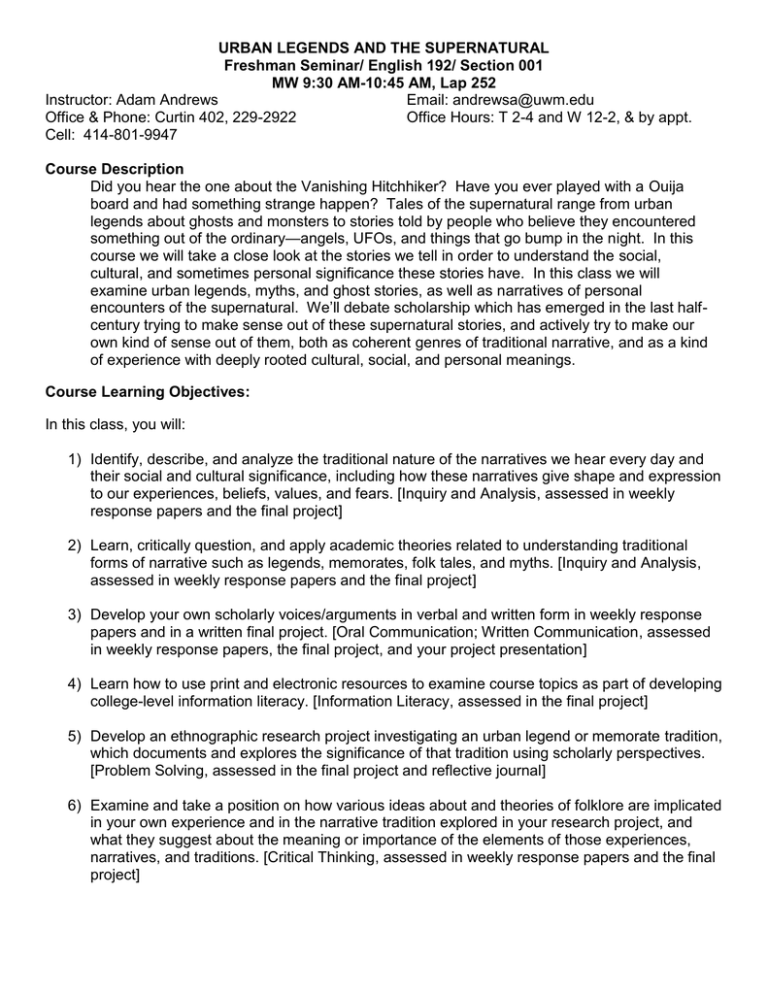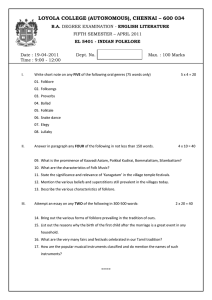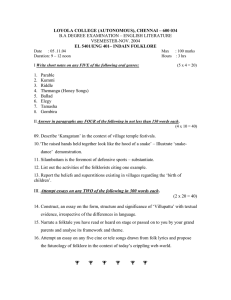URBAN LEGENDS AND THE SUPERNATURAL Freshman Seminar/ English 192/ Section 001
advertisement

URBAN LEGENDS AND THE SUPERNATURAL Freshman Seminar/ English 192/ Section 001 MW 9:30 AM-10:45 AM, Lap 252 Instructor: Adam Andrews Email: andrewsa@uwm.edu Office & Phone: Curtin 402, 229-2922 Office Hours: T 2-4 and W 12-2, & by appt. Cell: 414-801-9947 Course Description Did you hear the one about the Vanishing Hitchhiker? Have you ever played with a Ouija board and had something strange happen? Tales of the supernatural range from urban legends about ghosts and monsters to stories told by people who believe they encountered something out of the ordinary—angels, UFOs, and things that go bump in the night. In this course we will take a close look at the stories we tell in order to understand the social, cultural, and sometimes personal significance these stories have. In this class we will examine urban legends, myths, and ghost stories, as well as narratives of personal encounters of the supernatural. We’ll debate scholarship which has emerged in the last halfcentury trying to make sense out of these supernatural stories, and actively try to make our own kind of sense out of them, both as coherent genres of traditional narrative, and as a kind of experience with deeply rooted cultural, social, and personal meanings. Course Learning Objectives: In this class, you will: 1) Identify, describe, and analyze the traditional nature of the narratives we hear every day and their social and cultural significance, including how these narratives give shape and expression to our experiences, beliefs, values, and fears. [Inquiry and Analysis, assessed in weekly response papers and the final project] 2) Learn, critically question, and apply academic theories related to understanding traditional forms of narrative such as legends, memorates, folk tales, and myths. [Inquiry and Analysis, assessed in weekly response papers and the final project] 3) Develop your own scholarly voices/arguments in verbal and written form in weekly response papers and in a written final project. [Oral Communication; Written Communication, assessed in weekly response papers, the final project, and your project presentation] 4) Learn how to use print and electronic resources to examine course topics as part of developing college-level information literacy. [Information Literacy, assessed in the final project] 5) Develop an ethnographic research project investigating an urban legend or memorate tradition, which documents and explores the significance of that tradition using scholarly perspectives. [Problem Solving, assessed in the final project and reflective journal] 6) Examine and take a position on how various ideas about and theories of folklore are implicated in your own experience and in the narrative tradition explored in your research project, and what they suggest about the meaning or importance of the elements of those experiences, narratives, and traditions. [Critical Thinking, assessed in weekly response papers and the final project] 7) Examine legend and narrative traditions from other cultures and explain how their varying historical and social contexts are implicated in those traditions. [Global Learning, assessed in response papers for related readings] 8) Examine the ethical implications of folklore research and fieldwork, and make responsible decisions regarding the representation of research participants, their cultures, and their beliefs. [Ethical Reasoning, assessed in the final project and reflective journal] GER Statement: Learning Outcomes for this Course This course meets the UWM General Education Requirements in the division of the Humanities. All Humanities courses have the following learning outcome: “Students will be able to identify the formation, traditions, and ideas essential to major bodies of historical, cultural, literary, or philosophical knowledge.” In addition, this course addresses another Humanities learning outcome: “respond coherently and persuasively to the materials of humanities study; this may be through logical, textual, formal, historical, or aesthetic analysis, argument and/or interpretation.” GER Assessment: The first of these outcomes will be achieved through reading a selection of folklore scholarship and research about urban legends and memorates, and assessed through weekly response papers and the final project. The second outcome will be primarily assessed through the final project. UW Shared Learning Goals: This course, in the final project and the associated reflective journal, addresses the following four UW Shared Learning goals: Critical and Creative Thinking Skills including inquiry, problem solving, and higher-order qualitative and quantitative reasoning (Course Goals 1,2,5,6). Effective Communication Skills including listening, speaking, reading, writing, and information literacy (Course Goals 3, 4) Intercultural Knowledge and Competence including the ability to interact and work with people from diverse backgrounds and cultures; to lead or contribute support to those who lead; and to empathize with and understand those who are different than they are (Course Goal 7) Individual, Social, and Environmental Responsibility including civic knowledge and engagement (both local and global), ethical reasoning, and action (Course Goal 8). Course Policies Attendance and Participation Policies: Attendance: You may miss 3 class periods for any reason without penalty in this FirstYear Seminar. After that you become ineligible to earn an A for attendance/participation. If you miss 6 or more classes, you will automatically receive an F in the course. Please arrive to class on time and prepared to discuss the day’s assigned reading. Policy on Lateness to and Leaving Early from Class: Because my determination of your final grade involves an evaluation of your class participation and in-class writing in addition to your out-of-class writing, it is important that you attend class regularly. Every time you miss in-class writing, project presentations, or class discussions, you are missing what you are supposed to be learning in English 192: the more classes you miss, the more your final course grade will be negatively affected. If you arrive late to class, it is your responsibility to ask to sign the attendance sheet at the end of class. Students who are late to class more than three times cannot receive an “A” for their attendance, participation, and preparedness grade. Policy on Smartphones, Tablets, and Laptops: In short, your cell phones and all other electronic devices should be off and put away during class, unless we are using them in class (we will sometimes use your laptops in class). You may use laptops or tablets to electronically bring your readings with you to class; however, using your laptops for non-class activities is not permitted. Please do not rely on smartphones to display .pdf readings, because they are too small and generally too slow to be useful in class. Preparedness for Class & In-class Conduct: I cannot emphasize strongly enough the importance of your coming to class each day prepared to think about and work with that day’s assignments. As a college student, you are co-responsible, along with me and your fellow classmates, for making each class session productive: it is therefore crucial that you arrive to class having completed the day’s reading and writing assignments. Students are expected to avoid texting or other disruptive activities while class is in session. Students with a pattern of habitually disrupting class or “tuning out” of the discussion will be assigned a participation/preparedness grade of C or lower. UWM Email Policy As a requirement of this class you MUST check your UWM email account at least several times a week, and preferably every day. You are responsible for checking your UWM email regularly to receive any English 192-related information I may send out during the semester. Social Media Requirement You are required to join the Facebook group for this class, for the duration of the class. This is a closed group, which allows us to share relevant material from the Web with one another, and allows your course mentor or myself to share reminders of due dates and upcoming courserelated events. If you do not use Facebook, or would to discuss this requirement, please contact me at andrewsa@uwm.edu. Required Work/Grading In this course you will read scholarship about various belief traditions, legends, and narratives of encounters with the supernatural, do your own original research on belief traditions and narratives among your own family and friends, and write a final project paper that uses class concepts to analyze and make sense of those narratives and beliefs. In the second half of the semester, each student’s own research will become part of the course. Students will do formal presentations of their work, and then we will work as a class to develop, critique, and think through each project. Students will then revise and extend their project papers into their final form. During the last part of the semester, students will also do reflective writing considering and recording their fieldwork experiences and observations, and thinking through their writing process for the final paper. This reflective writing will done in the form of a Reflective Journal that will be turned in with the Final Project. Grades in the class will be determined according to the formula below: Attendance, participation, and being prepared for class (15%), Weekly two-page papers responding to assigned readings (25%), Project Presentation (10%) Final Project Paper First Draft (5%) Final Project Paper-Revised (8+ pages) (25%) Reflective Journal (20%) The Rubrics for weekly response papers, the presentation, the final project, and the reflective journal are available on D2L. You are responsible for reviewing the rubrics and understanding how you will be graded. Required Texts · · Electronic readings available on D2L (in .pdf Adobe Reader format) Selected contemporary films (shown in class) OTHER INFORMATION: Class website D2L (Desire to Learn) is a course management system that hosts “technology enhanced” courses at UWM including this one. Documents for this course such as this syllabus and assignment descriptions, along with assigned readings will be stored in our D2L coursesite under Content. Get to our coursesite by logging into D2L from the UWM homepage. You should see a welcome page with a link to our coursesite to click on. If you have any problems with D2L, let me know and contact the UWM Help Desk at 229-4040. Student Accessibility Center/Students with Disabilities: If you work with an advisor at the Student Accessibility Center, please send your VISA to me within the first week of class. I will work with you and your advisor to make any accommodations needed so you can participate in the course. If you are concerned that you may have a learning disability, visit or call their office in 112 Mitchell Hall. Academic Honesty: We will spend time in class discussing academic honesty, and its converse, plagiarism. Plagiarism has serious consequences for writers in the university community. The university and the English Department take disciplinary action when a student is discovered to have used someone else’s work as their own, or to have submitted a paper written for one class in another. See UWM’s Academic Misconduct Policy for more information: http://www4.uwm.edu/acad_aff/policy/academicmisconduct.cfm COURSE READING LIST (All Readings Available on D2L): Adler, Shelley. 1991. Sudden Unexpected Nocturnal Death Syndrome among Hmong Immigrants: Examining the Role of the Nightmare. Journal of American Folklore 104, no. 411:54-71. Ben-Amos, Dan. 1993. "Context" in Context. Western Folklore, Vol. 52, No. 2/4, Theorizing Folklore: Toward New Perspectives on the Politics of Culture (Apr. - Oct.), pp. 209-226 Bennett, Gillian. 1987. “The Dead” from Traditions of Belief: Women and the Supernatural. Penguin Books, 36-81. Bennett, Gillian. 1998. “The Vanishing Hitchhiker at Fifty-Five.” Western Folklore, Vol. 57, No. 1 (Winter), pp. 1-17 Bennett, Gillian. 1999. “From Private Experience to Public Performance: Supernatural Experience as Narrative.” Alas, Poor Ghost! Traditions of Belief in Story and Discourse. Utah State University Press, 115-137. Dewan, William. 2006. “A Saucerful of Secrets: An Interdisciplinary Analysis of UFO Experiences.” Journal of American Folklore 119(472):184-202 Ellis, Bill. 1994. “Speak to the Devil: Ouija Board Rituals Among American Adolescents.” Contemporary Legend 4: 61-90. Jones, Pamela. 1988. "There Was a Woman": La Llorona in Oregon. Western Folklore 47: 195211. Keyworth, David. 2002. “The Socio-Religious Beliefs and Nature of the Contemporary Vampire Subculture.” Journal of Contemporary Religion, Vol. 17, No. 3, pp. 355–370 Koven, Mikel. 2003. “Folklore Studies and Popular Film and Television: A Necessary Critical Survey.” The Journal of American Folklore, Vol. 116, No. 460 (Spring), pp. 176-195 Letcher, Andy. 2001. “The Scouring of the Shire: Fairies, Trolls and Pixies in Eco-Protest Culture.” Folklore, Vol. 112, No. 2 (Oct.), pp. 147-161 Lindahl, Carl. 1996. “Psychic Ambiguity at the Legend Core.” Contemporary Legend: A Reader, eds. Gillian Bennett and Paul Smith. Garland Publishing, 69-90. Oring, Elliot. 1986. On the Concepts of Folklore. In Folk Groups and Folklore Genres: An Introduction, ed. Elliott Oring, pp. 1-22. Logan, UT: Utah State University Press. Primiano, Leonard Norman. 1998. Angels and Americans. America 179, no. 10 (October 10):15-17. Reider, Noriko. 2003. “Transformation of the Oni: From the Frightening and Diabolical to the Cute and Sexy.” Asian Folklore Studies, Vol. 62, No. 1, pp. 133-15 Tucker, Elizabeth. 2007. “Campus Ghostlore,” and “Sensory Evidence.” From Haunted Halls: Ghostlore of American College Campuses. University Press of Mississippi, 3-72. Victor, Jeffrey. 1990. Satanic Cult Rumors as Contemporary Legend. Western Folklore, Vol. 49, No. 1, Contemporary Legends in Emergence (Jan.), pp. 51-81 Wilson, William A. 1986. Documenting Folklore. In Folk Groups and Folklore Genres: An Introduction, ed. Elliott Oring, pp. 227-244. Logan, UT: Utah State University Press. Wojcik, Daniel. 1996. "Polaroids from Heaven": Photography, Folk Religion, and the Miraculous Image Tradition at a Marian Apparition Site. The Journal of American Folklore, Vol. 109, No. 432 (Spring), pp. 129-148 SEPT W 2nd M 7th W 9th M 14th W 16th M 21st W M 23rd 28th W 30th OCT M 5th W 7th M 12th W 14th M 19th W 21st M 26th W 28th NOV M 2nd Note: The Schedule is Subject to Change at the Instructor’s Discretion Introduction, Syllabus; The Supernatural: The Study of Fiction or Belief? LABOR DAY Oring, Elliot. 1986. On the Concepts of Folklore. In Folk Groups and Folklore Genres: An Introduction, ed. Elliott Oring, pp. 1-22. Logan, UT: Utah State University Press. Bennett, Gillian. 1998. “The Vanishing Hitchhiker at Fifty-Five.” Western Folklore, Vol. 57, No. 1 (Winter), pp. 1-17 Jones, Pamela. 1988. "There Was a Woman": La Llorona in Oregon. Western Folklore 47:195-211. Lindahl, Carl. 1996. “Psychic Ambiguity at the Legend Core.” Contemporary Legend: A Reader, eds. Gillian Bennett and Paul Smith. Garland Publishing, 6990. APPLICATIONS: Bring your own Belief Legend to Class. Wilson, William A. 1986. Documenting Folklore. In Folk Groups and Folklore Genres: An Introduction, ed. Elliott Oring, pp. 227-244. Logan, UT: Utah State University Press. Bennett, Gillian. 1999. “From Private Experience to Public Performance: Supernatural Experience as Narrative.” Alas, Poor Ghost! Traditions of Belief in Story and Discourse. Utah State University Press, 115-137. Tucker, Elizabeth. 2007. “Campus Ghostlore,” and “Sensory Evidence.” From Haunted Halls: Ghostlore of American College Campuses. University Press of Mississippi, 3-72. Bennett, Gillian. 1987. “The Dead” from Traditions of Belief: Women and the Supernatural. Penguin Books, 36-81. (PART I: The Evil Dead) Bennett, Gillian. 1987. “The Dead” from Traditions of Belief: Women and the Supernatural. Penguin Books, 36-81. (PART II: The Good Dead) APPLICATIONS: Understanding Memorates. Bring a memorate to class, from someone you know, for discussion. Research Project Proposals Due. Ben-Amos, Dan. 1993. "Context" in Context. Western Folklore, Vol. 52, No. 2/4, Theorizing Folklore: Toward New Perspectives on the Politics of Culture (Apr. - Oct., 1993), pp. 209-226 Adler, Shelley. 1991. Sudden Unexpected Nocturnal Death Syndrome among Hmong Immigrants: Examining the Role of the Nightmare. Journal of American Folklore 104, no. 411:54-71. APPLICATIONS: Putting Nightmares in Context. (Bring a Night Terror story from someone you know, gathering as much relevant context from your informant as you can). APPLICATIONS: Putting Nightmares in Context. (Bring a Night Terror story from someone you know, gathering as much relevant context from your informant as you can). Victor, Jeffrey. 1990. Satanic Cult Rumors as Contemporary Legend. Western Folklore, Vol. 49, No. 1, Contemporary Legends in Emergence (Jan., 1990), pp. 5181 Ellis, Bill. 1994. “Speak to the Devil: Ouija Board Rituals Among American Adolescents.” Contemporary Legend 4: 61-90. Reider, Noriko. 2003. “Transformation of the Oni: From the Frightening and Diabolical to the Cute and Sexy.” Asian Folklore Studies, Vol. 62, No. 1 (2003), pp. 133-15 W 4th M W M W M W M 9th 11th 16th 18th 23rd 25th 30th DEC W 2nd M W M 7th 9th 14th Urban Legends in Pop Culture: Analyzing Movies Koven, Mikel. 2003. “Folklore Studies and Popular Film and Television: A Necessary Critical Survey.” The Journal of American Folklore, Vol. 116, No. 460 (Spring), pp. 176-195 Urban Legends in Pop Culture: Analyzing Movies Project Presentations (5 students) Project Presentations (5 students) Project Presentations (5 students) Project Presentations (5 students) THANKSGIVING BREAK Primiano, Leonard Norman. 1998. Angels and Americans. America 179, no. 10 (October 10): 15-17. Dewan, William. 2006. “A Saucerful of Secrets: An Interdisciplinary Analysis of UFO Experiences.” Journal of American Folklore 119(472):184-202 Reading TBA Reading TBA Final Class Meeting FINAL DRAFT of your Project Paper, and your Reflective Essay, are both due on Monday, Dec 14th, at 11:59pm, in the dropbox. Syllabus Addendum: Policy Links1 1. Students with disabilities. For more information about accommodations, see: http://www4.uwm.edu/sac/SACltr.pdf 2. Religious observances. For information about accommodations for religious observances, see: http://www4.uwm.edu/secu/docs/other/S1.5.htm 3. Students called to active military duty. For information about accommodations for absences due to call-up of reserves to active military duty: Students: http://www4.uwm.edu/current_students/military_call_up.cfm Employees: http://www4.uwm.edu/secu/docs/other/S40.htm (Editorially Revised, 3/25/09) 4. Incompletes. A notation of "incomplete" may be given in lieu of a final grade to a student who has carried a subject successfully until the end of a semester but who, because of illness or other unusual and substantiated cause beyond the student's control, has been unable to take or complete the final examination or to complete some limited amount of term work. http://www4.uwm.edu/secu/docs/other/S31.pdf 5. Discriminatory conduct (such as sexual harassment). Discriminatory conduct will not be tolerated by the University. It poisons the work and learning environment of the University and threatens the careers, educational experience, and well-being of students, faculty, and staff. http://www4.uwm.edu/secu/docs/other/S47.pdf 6. Academic misconduct. Cheating on exams or plagiarism are violations of the academic honor code and carry severe sanctions, including failing a course or even suspension or dismissal from the University. http://www4.uwm.edu/acad_aff/policy/academicmisconduct.cfm 7. Complaint procedures. Students may direct complaints to the head of the academic unit or department in which the complaint occurs. If the complaint allegedly violates a specific university policy, it may be directed to the head of the department or academic unit in which the complaint occurred or to the appropriate university office responsible for enforcing the policy. http://www4.uwm.edu/secu/docs/other/S49.7.htm 8. Grade appeal procedures. A student may appeal a grade on the grounds that it is based on a capricious or arbitrary decision of the course instructor. Such an appeal shall follow the established procedures adopted by the department, college, or school in which the course resides or in the case of graduate students, the Graduate School. These procedures are available in writing from the respective department chairperson or the Academic Dean of the College/School. http://www4.uwm.edu/secu/docs/other/S28.htm 9. Other The final exam requirement, the final exam date requirement, etc. http://www4.uwm.edu/secu/docs/other/S22.htm 1 Supplement to UWM FACULTY DOCUMENT NO. 1895, October 21, 1993; Revised March 16, 2006; Revised January 24, 2008; Editorially Revised, 8/26/11. Syllabus Addendum: Credit Hours The university has asked departments to break down for students how much time they will spend working on various aspects of their classes. As the UW System assumes “that study leading to one semester credit represents an investment of time by the average student of not fewer than 48 hours” (UWS ACPS 4), a 3-credit course such as this one will require a minimum of 144 (3 x 48) hours of your time. You may find it necessary to spend additional time on a course; the numbers below only indicate that the course will not require any less of your time. If this is a traditional, or face-to-face course, you will spend a minimum of 37.5 hours in the classroom 75 hours preparing for class, which may include reading, note taking, completing minor exercises and assignments, and discussing course topics with classmates and the instructor in structured settings 31.5 hours preparing for and writing major papers and/or exams. If this is an online course, you will spend a minimum of 37.5 hours reviewing instructional materials prepared by your instructor and placed online 75 hours preparing for class, which may include reading, note taking, completing minor exercises and assignments, and discussing course topics with classmates and the instructor in structured settings 31.5 hours preparing for and writing major papers and/or exams. If this is a hybrid course, you will spend a minimum of 18.75 hours in the classroom 18.75 hours reviewing instructional materials prepared by your instructor and placed online 75 hours preparing for class, which may include reading, note taking, completing minor exercises and assignments, and discussing course topics with classmates and the instructor in structured settings 31.5 hours preparing for and writing major papers and/or exams. Notes The breakdown above is for a standard 15-week semester. In a 16-week semester, the numbers breakdown above changes as follows. Traditional: 40 hours in classroom, 80 for preparation, 24 for papers and exams; online: 40 hours of online instruction, 80 for preparation, 24 for papers and exams; hybrid: 20 hours in classroom, 20 for online instruction, 80 hours for preparation, 24 for papers and exams. Again, these are minimums. UWM Credit Hour Policy, University of Wisconsin-Milwaukee Faculty Document No. 2838, can be found at https://www4.uwm.edu/secu/docs/faculty/2838_Credit_Hour_Policy.pdf. UWS ACPS 4, the University Of Wisconsin System Policy On Academic Year Definition And Assorted Derivatives, can be found at http://www.uwsa.edu/acss/acps/acps4.pdf.


